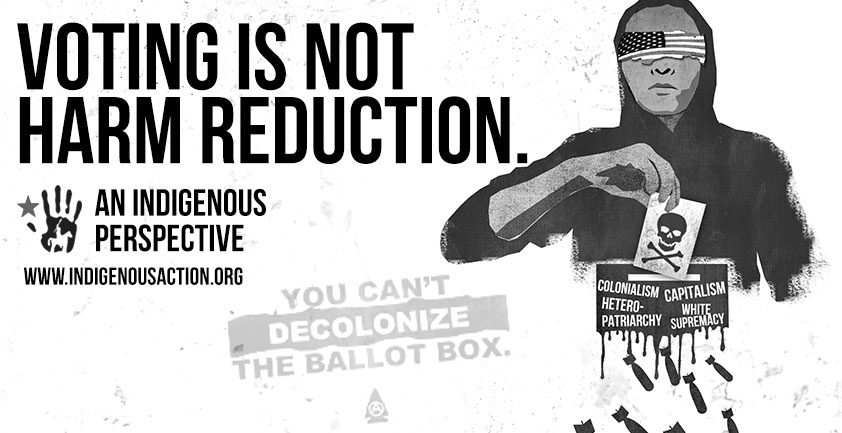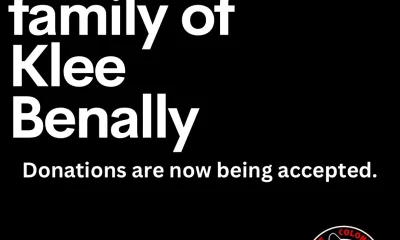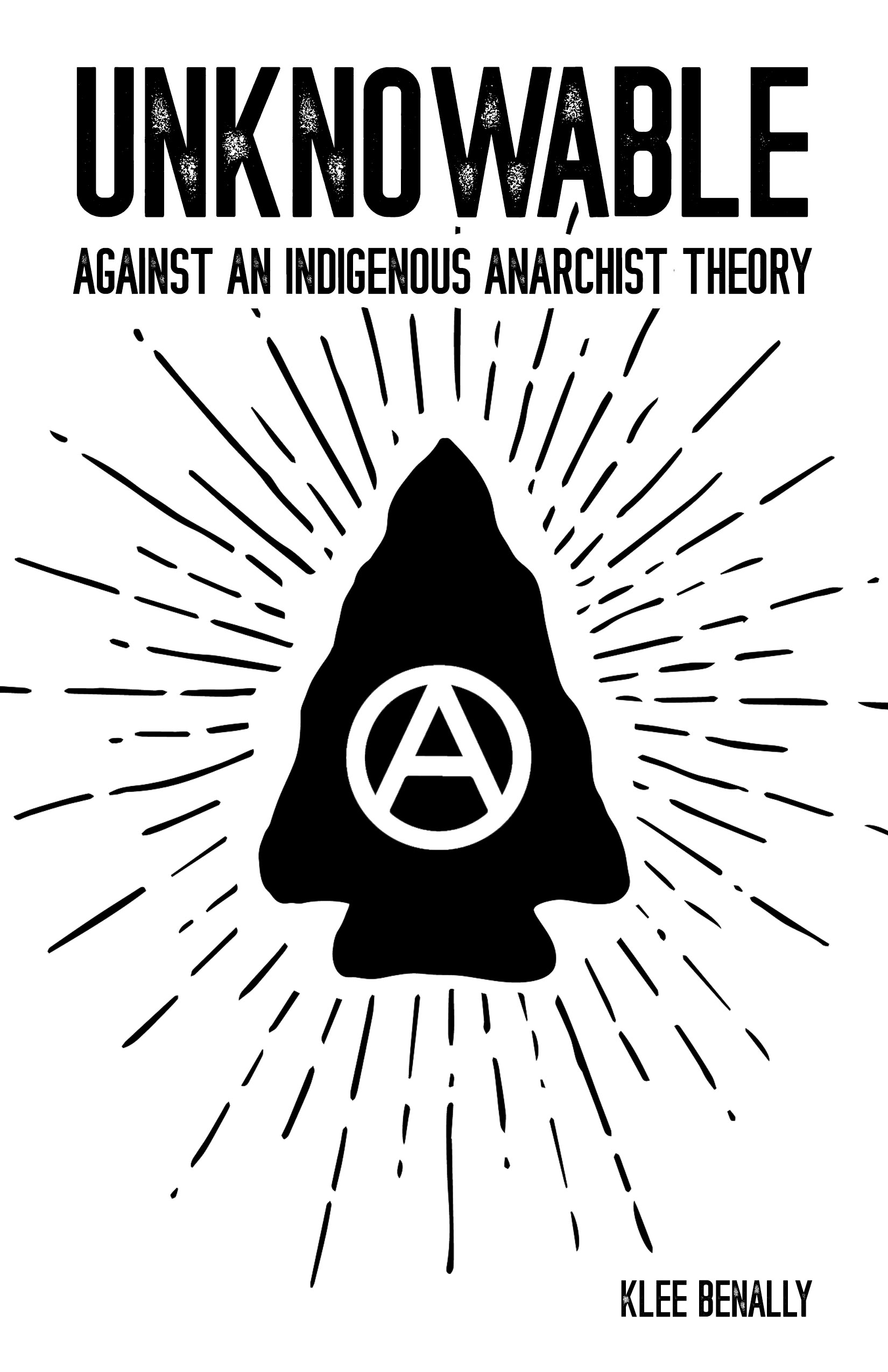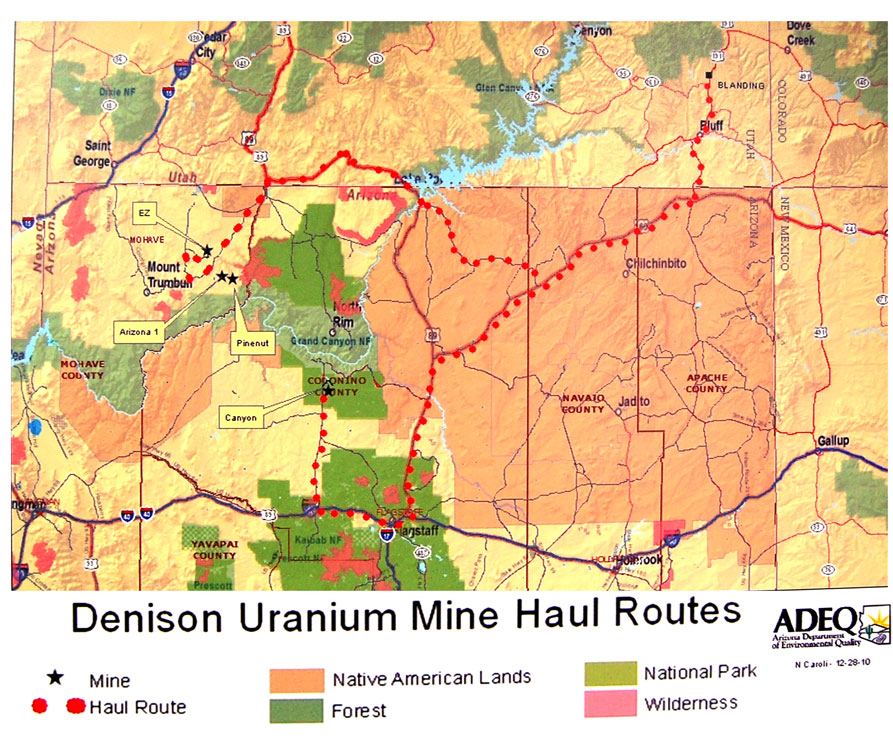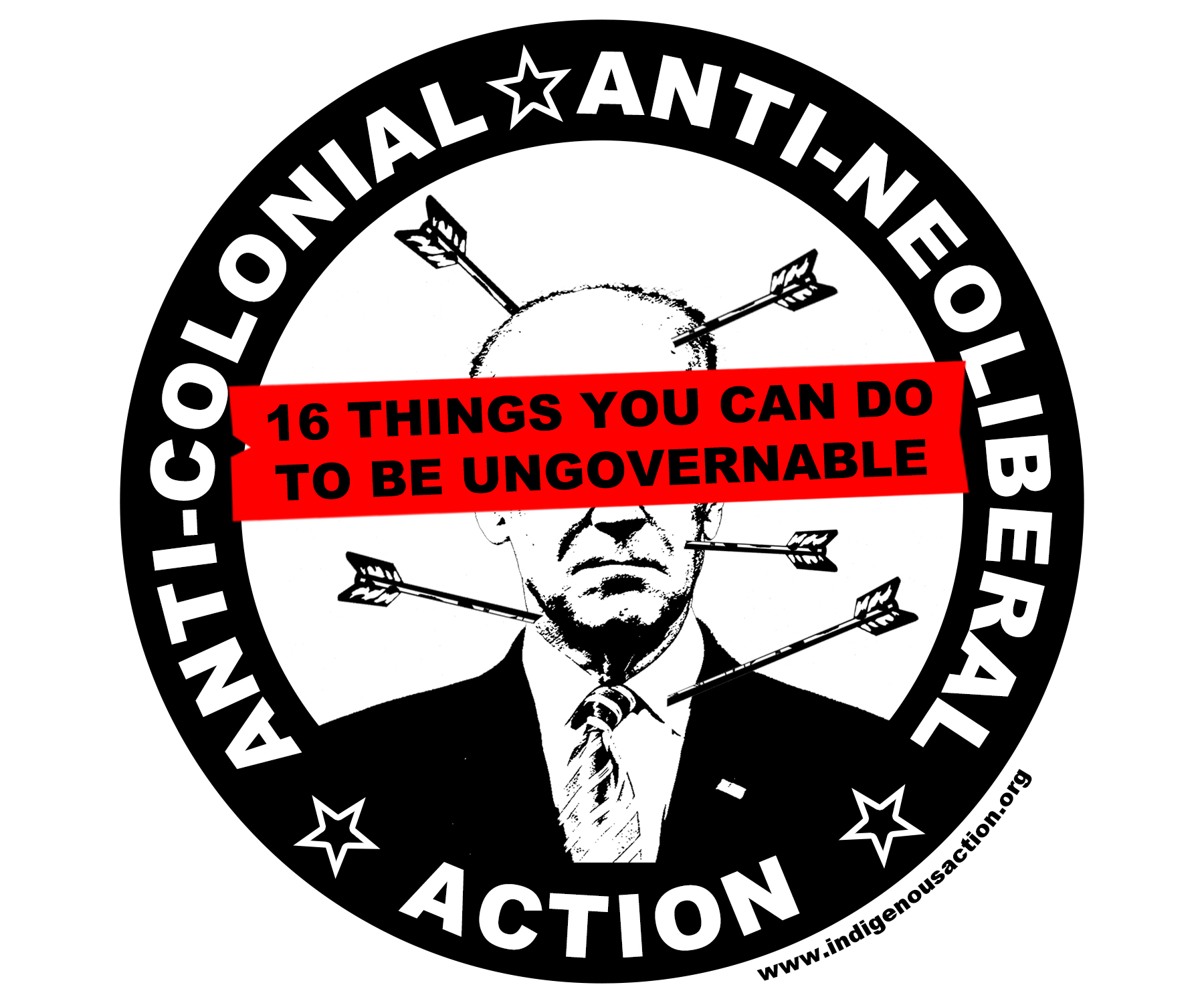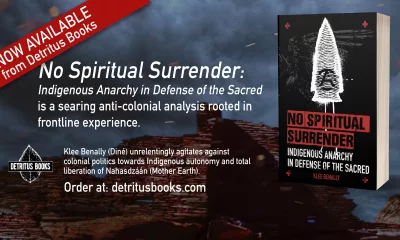Commentary & Essays
Accomplices Not Allies: Abolishing the Ally Industrial Complex
Published
11 years agoon
By
Rudy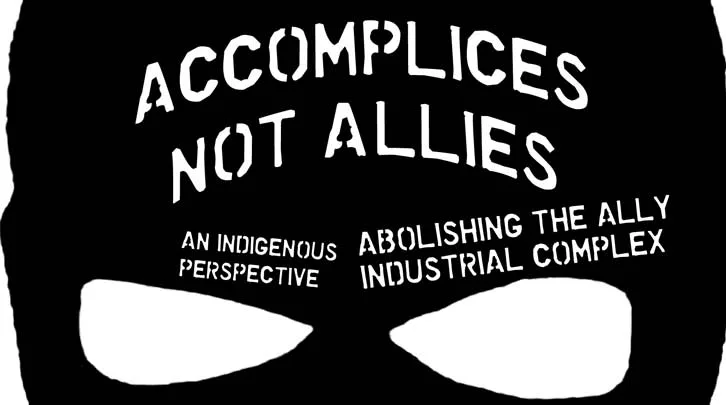
An Indigenous perspective & provocation.
![]() Printable version available here. (PDF | 3.3MB)
Printable version available here. (PDF | 3.3MB)
Print friendly cover w/corrections here. (PDF | 3.2MB)
This provocation is intended to intervene in some of the current tensions around solidarity/support work as the current trajectories are counter-liberatory from my perspective. Special thanks to DS in Phoenix for convos that lead to this ‘zine and all those who provided comments/questions/disagreements. Don’t construe this as being for “white young middle class allies”, just for paid activists, non-profits, or as a friend said, “downwardly-mobile anarchists or students.” There are many so-called “allies” in the migrant rights struggle who support “comprehensive immigration reform” which furthers militarization of Indigenous lands.
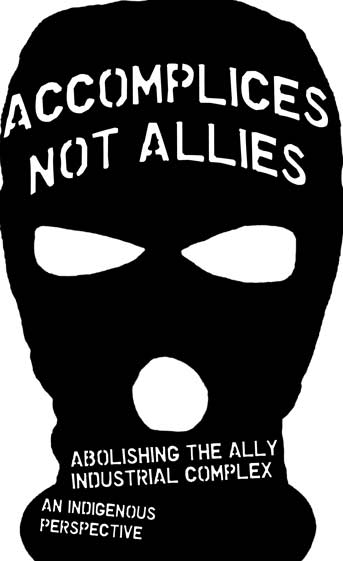 The ally industrial complex has been established by activists whose careers depend on the “issues” they work to address. These nonprofit capitalists advance their careers off the struggles they ostensibly support. They often work in the guise of “grassroots” or “community-based” and are not necessarily tied to any organization.
The ally industrial complex has been established by activists whose careers depend on the “issues” they work to address. These nonprofit capitalists advance their careers off the struggles they ostensibly support. They often work in the guise of “grassroots” or “community-based” and are not necessarily tied to any organization.
They build organizational or individual capacity and power, establishing themselves comfortably among the top ranks in their hierarchy of oppression as they strive to become the ally “champions” of the most oppressed. While the exploitation of solidarity and support is nothing new, the commodification and exploitation of allyship is a growing trend in the activism industry.
Anyone who concerns themselves with anti-oppression struggles and collective liberation has at some point either participated in workshops, read ‘zines, or been parts of deep discussions on how to be a “good” ally. You can now pay hundreds of dollars to go to esoteric institutes for an allyship certificate in anti-oppression. You can go through workshops and receive an allyship badge. In order to commodify struggle it must first be objectified. This is exhibited in how “issues” are “framed” & “branded.” Where struggle is commodity, allyship is currency.
Ally has also become an identity, disembodied from any real mutual understanding of support.
The term ally has been rendered ineffective and meaningless.
Accomplices not allies.
ac·com·plice
noun: accomplice; plural noun: accomplices
a person who helps another commit a crime.
There exists a fiercely unrelenting desire to achieve total liberation, with the land and, together.
At some point there is a “we”, and we most likely will have to work together. This means, at the least, formulating mutual understandings that are not entirely antagonistic, otherwise we may find ourselves, our desires, and our struggles, to be incompatible.
There are certain understandings that may not be negotiable. There are contradictions that we must come to terms with and certainly we will do this on our own terms.
But we need to know who has our backs, or more appropriately: who is with us, at our sides?
The risks of an ally who provides support or solidarity (usually on a temporary basis) in a fight are much different than that of an accomplice. When we fight back or forward, together, becoming complicit in a struggle towards liberation, we are accomplices. Abolishing allyship can occur through the criminalization of support and solidarity.
While the strategies and tactics of asserting (or abolishing depending on your view) social power and political power may be diverse, there are some hard lessons that could bear not replicating.
Consider the following to be a guide for identifying points of intervention against the ally industrial complex.
“Salvation aka Missionary Work & Self Therapy”
Allies all too often carry romantic notions of oppressed folks they wish to “help.” These are the ally “saviors” who see victims and tokens instead of people.
This victimization becomes a fetish for the worst of the allies in forms of exotification, manarchism, ‘splaining, POC sexploitation, etc. This kind of relationship generally fosters exploitation between both the oppressed and oppressor. The ally and the allied-with become entangled in an abusive relationship. Generally neither can see it until it’s too late. This relationship can also digress into co-dependency which means they have robbed each other of their own power. Ally “saviors” have a tendency to create dependency on them and their function as support. No one is here to be saved, we don’t need “missionary allies” or pity.
Guilt is also a primary ally motivating factor. Even if never admitted, guilt & shame generally function as motivators in the consciousness of an oppressor who realizes that they are operating on the wrong side. While guilt and shame are very powerful emotions, think about what you’re doing before you make another community’s struggle into your therapy session. Of course, acts of resistance and liberation can be healing, but tackling guilt, shame, and other trauma require a much different focus, or at least an explicit and consensual focus. What kind of relationships are built on guilt and shame?
“Exploitation & Co-optation”
Those who co-opt are only there to advance self interests (usually it’s either notoriety or financial). As these “allies” seek to impose their agenda, they out themselves. The ‘radical’ more militant-than-thou “grassroots” organizers are keen on seeking out “sexy” issues to co-opt (for notoriety/ego/super ally/most radical ally) and they set the terms of engagement or dictate what struggles get amplified or marginalized irregardless of whose homelands they’re operating on. The nonprofit establishment or non-profit industrial complex (NPIC) also seeks out “sexy” or “fundable” issues to co-opt and exploit as these are ripe for the grant funding that they covet. Too often, Indigenous liberation struggles for life and land, by nature, directly confront the entire framework to which this colonial & capitalist society is based on. This is threatening to potential capitalist funders so some groups are forced to compromise radical or liberatory work for funding, others become alienated and further invisibilized or subordinated to tokenism. Co-opters most often show up to the fight when the battle has already escalated and it’s a little too late.
These entities almost always propose trainings, workshops, action camps, and offer other specialized expertise in acts of patronization. These folks are generally paid huge salaries for their “professional” activism, get over-inflated grants for logistics and “organizational capacity building”, and struggles may become further exploited as “poster struggles” for their funders. Additionally, these skills most likely already exist within the communities or they are tendencies that need only be provoked into action.
These aren’t just dynamics practiced by large so-called non-governmental organizations (NGOs), individuals are adept at this self-serving tactic as well.
Co-optation also functions as a form of liberalism. Allyship can perpetuate a neutralizing dynamic by co-opting original liberatory intent into a reformist agenda.
Certain folks in the struggles (usually movement “personalities”) who don’t upset the ally establishment status quo can be rewarded with inclusion in the ally industry.
“Self proclaiming/confessional Allies”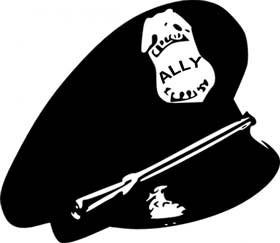
All too often folks show up with an, “I am here to support you!” attitude that they wear like a badge. Ultimately making struggles out to feel like an extracurricular activity that they are getting “ally points” for. Self-asserted allies may even have anti-oppression principles and values as window dressing. Perhaps you’ve seen this quote by Lilla Watson on their materials: “If you come here to help me, you’re wasting your time. If you come because your liberation is bound up with mine, then let us work together.” They are keen to posture, but their actions are inconsistent with their assertions.
Meaningful alliances aren’t imposed, they are consented upon. The self-proclaimed allies have no intention to abolish the entitlement that compelled them to impose their relationship upon those they claim to ally with.
“Parachuters”
Parachuters rush to the front lines seemingly from out-of-nowhere. They literally move from one hot or sexy spot to the next. They also fall under the “savior” & “self-proclaimed” categories as they mostly come from specialized institutes, organizations, & think-tanks. They’ve been through the trainings, workshops, lectures, etc., they are the “experts” so they know “what is best.” This paternalistic attitude is implicit in the structures (non-profits, institutes, etc) these “allies” derive their awareness of the “issues” from. Even if they reject their own non-profit programming, they are ultimately reactionary, entitled, and patronizing, or positioning with power-over, those they proclaim allyship with. It’s structural patronization that is rooted in the same dominion of hetero-patriarchal white supremacy.
Parachuters are usually missionaries with more funding.
“Academics, & Intellectuals”
Although sometimes directly from communities in struggle, intellectuals and academics also fit neatly in all of these categories. Their role in struggle can be extremely patronizing. In many cases the academic maintains institutional power above the knowledge and skill base of the community/ies in struggle. Intellectuals are most often fixated on un-learning oppression. These lot generally don’t have their feet on the ground, but are quick to be critical of those who do.
Should we desire to merely “unlearn” oppression, or to smash it to fucking pieces, and have it’s very existence gone?
An accomplice as academic would seek ways to leverage resources and material support and/or betray their institution to further liberation struggles. An intellectual accomplice would strategize with, not for and not be afraid to pick up a hammer.
“Gatekeepers”
Gatekeepers seek power over, not with, others. They are known for the tactics of controlling and/or withholding information, resources, connections, support, etc. Gatekeepers come from the outside and from within. When exposed they are usually rendered ineffective (so long as there are effective accountability/responsibility mechanisms).
Gatekeeping individuals and organizations, like “savior allies,” also have tendency to create dependency on them and their function as support. They have a tendency to dominate or control.
“Navigators & Floaters”
The “navigating” ally is someone who is familiar or skilled in jargon and maneuvers through spaces or struggles yet doesn’t have meaningful dialogue (by avoiding debates or remaining silent) or take meaningful action beyond their personal comfort zones (this exists with entire organizations too). They uphold their power and, by extension, the dominant power structures by not directly attacking them.
“Ally” here is more clearly defined as the act of making personal projects out of other folk’s oppression. These are lifestyle allies who act like passively participating or simply using the right terminology is support. When shit goes down they are the first to bail. They don’t stick around to take responsibility for their behavior. When confronted they often blame others and attempt to dismiss or delegitimize concerns.
Accomplices aren’t afraid to engage in uncomfortable/unsettling/challenging debates or discussions.
Floaters are “allies” that hop from group to group and issue to issue, never being committed enough but always wanting their presence felt and their voices heard. They tend to disappear when it comes down to being held accountable or taking responsibility for fucked up behavior.
Floaters are folks you can trust to tell the cops to “fuck off” but never engage in mutual risk, constantly put others at risk, are quick to be authoritarian about other peoples over stepping privileges, but never check their own. They basically are action junkie tourists who never want to be part of paying the price, the planning, or the responsibility but always want to be held up as worthy of being respected for “having been there” when a rock needed throwing, bloc needs forming, etc.
This dynamic is also important to be aware of for threats of infiltration. Provocateurs are notorious floaters going from place to place never being accountable to their words or actions. Infiltration doesn’t necessarily have to come from the state, the same impacts can occur by “well meaning” allies. It’s important to note that calling out infiltrators bears serious implications and shouldn’t be attempted without concrete evidence.
“Acts of Resignation”
Resignation of agency is a by-product of the allyship establishment. At first the dynamic may not seem problematic, after all, why would it be an issue with those who benefit from systems of oppression to reject or distance themselves from those benefits and behaviors (like entitlement, etc) that accompany them? In the worst cases, “allies” themselves act paralyzed believing it’s their duty as a “good ally.” There is a difference between acting for others, with others, and for one’s own interests, be explicit.
You wouldn’t find an accomplice resigning their agency, or capabilities as an act of “support.” They would find creative ways to weaponize their privilege (or more clearly, their rewards of being part of an oppressor class) as an expression of social war. Otherwise we end up with a bunch of anti-civ/primitivist appropriators or anarcho-hipsters, when saboteurs would be preferred.
Suggestions for some ways forward for anti-colonial accomplices:
Allyship is the corruption of radical spirit and imagination, it’s the dead end of decolonization.
The ally establishment co-opts decolonization as a banner to fly at its unending anti-oppression gala. What is not understood is that decolonization is a threat to the very existence of settler “allies.” No matter how liberated you are, if you are still occupying Indigenous lands you are still a colonizer.
Decolonization (the process of restoring Indigenous identity) can be very personal and should be differentiated, though not disconnected, from anti-colonial struggle.
The work of an accomplice in anti-colonial struggle is to attack colonial structures & ideas.
The starting point is to articulate your relationship to Indigenous Peoples whose lands you are occupying. This is beyond acknowledgment or recognition. This can be particularly challenging for “non-federally recognized” Indigenous Peoples as they are invisiblized by the state and by the invaders occupying their homelands.
It may take time to establish lines of communication especially as some folks may have already been burnt by outsiders. If you do not know where or how to contact folks, do some ground work, research (but don’t rely on anthropological sources, they are euro-centric), and pay attention. Try to more listening than speaking and planning.
In long-term struggles communication may be ruptured between various factions, there are no easy ways to address this. Don’t try to work the situation out, but communicate openly with consideration of the points below.
Sometimes other Indigenous Peoples are “guests” on other’s homelands yet are tokenized as the Indigenous representatives for the “local struggles”. This dynamic also perpetuates settler colonialism. A lot of people also assume Indigenous folks are all on the same page “politically,” we’re definitely not.
While there may be times folks have the capacity and patience to do so, be aware of the dynamics perpetuated by hand-holding.
Understand that it is not our responsibility to hold your hand through a process to be an accomplice.
Accomplices listen with respect for the range of cultural practices and dynamics that exists within various Indigenous communities.
Accomplices aren’t motivated by personal guilt or shame, they may have their own agenda but they are explicit.
Accomplices are realized through mutual consent and build trust. They don’t just have our backs, they are at our side, or in their own spaces confronting and unsettling colonialism. As accomplices we are compelled to become accountable and responsible to each other, that is the nature of trust.
Don’t wait around for anyone to proclaim you to be an accomplice, you certainly cannot proclaim it yourself. You just are or you are not. The lines of oppression are already drawn. Direct action is really the best and may be the only way to learn what it is to be an accomplice. We’re in a fight, so be ready for confrontation and consequence.
If you are wondering whether to get involved with or to support an organization:
Be suspect of anyone and any organization who professes allyship, decolonization work, and/or wears their relationships with Indigenous Peoples as at badge.
Use some of the points above to determine primary motives.
Look at the organizations funding. Who is getting paid? How are they transparent? Who’s defining the terms? Who sets the agenda? Do campaigns align with what the needs are on the ground?
Are there local grassroots Indigenous People directly involved with the decision making?
You may like
#policestate
Do “We keep us safe”? Notes on Action Security & Some Resources
Published
2 years agoon
September 30, 2023By
Rudy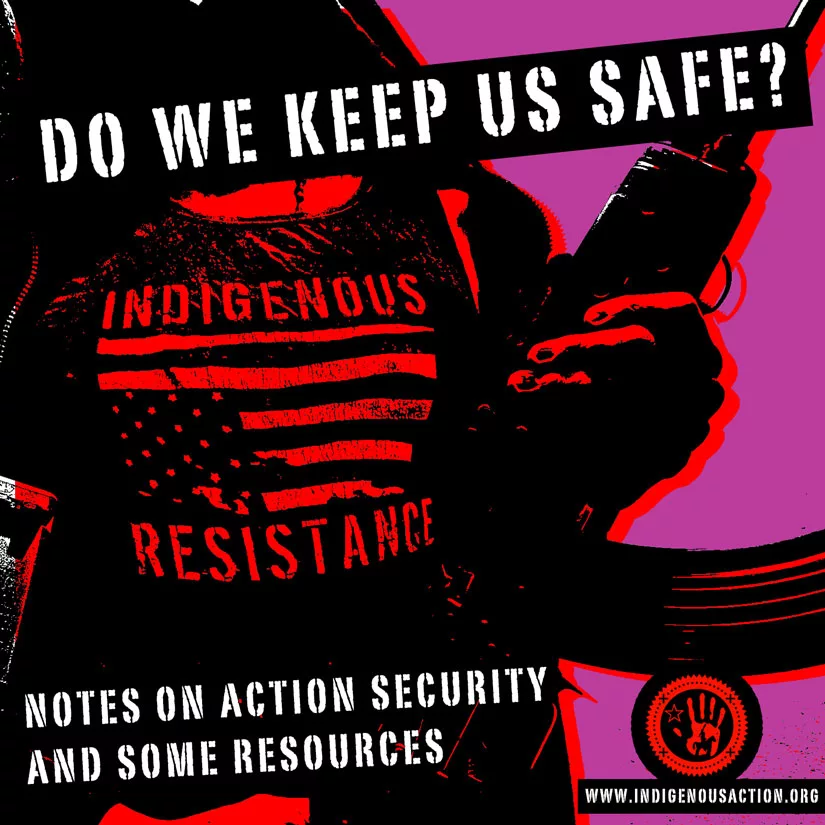
“We keep us safe!” is an abolitionist assertion that the state or some paternalistic organization will not protect us from colonial, fascist, white supremacist, queerphobic attacks, so we must organize and defend ourselves and those we are in community with.
We cannot leave this slogan to be an empty gesture or posture. It must be conveyed with the necessary training and organizing to address the hyperpoliticized and conflictual environments that we organize in.
While we cannot anticipate and prevent all fascist assaults, if we pronounce that “we keep us safe,” we can and must do what we can to organize and be prepared. Liberal and “radical” non-profit managers constantly decrying the “inactions of cops” does not keep us safe, it only invokes further police violence. Additionally, calling on colonial politicians to respond to fascist violence as a “hate crime,” is really a call to further the carceral state and its institutional violences (courts, prisons, more policing, etc).
On September 28th, 2023 Jacob Johns, an Indigenous persn was shot by Ryan Martinez, a colonial invader and MAGA fascist at an action called to confront the re-establishment of a monument to the genocidal colonizer Juan de Oñate in so-called Española, New Mexico. This shooting occurred under the same watch of an organization that hosted a previous anti-Oñate monument action in 2020 where Scott Williams was shot and severely injured.
From Heather Heyer, Joseph Rosenbaum, and Anthony Huber to many more who have been injured or killed while resisting authoritarian nationalism (aka fascism), these deadly attacks are occurring within a context of historic, ongoing, and escalating colonial violence.
Since 2020, groups based in occupied New Mexico organizing anti-monument actions have been directly challenged for putting people at serious risk. Calls that have been made for more organized security have been denounced by inexperienced organizers in these groups.
These issues and considerations are not new, the Black Panther Party for Self Defense and AIM initiated armed patrols and armed resistance in the face of state, white supremacist, and colonial terror. Amorphous entities such as Antifa and Bash Back have continually mobilized street warfare in defensive and proactive ways. These groups have long recognized that we cannot merely rely on “safety in numbers,” (though numbers do help) our enemies are more organized than that, so why aren’t we?
We cannot pronounce liberation without simultaneously preparing and mobilizing defense.
As everyone should be doing mutual aid, everyone should be prepared for mutual defense. We cannot depend on any organizers or organizations to simply do this for us. If “We keep us safe,” we better fucking mean it.
As Goldfinch Gun Club stated, “Community defense has to be about solidarity and uplift mutual aid, not just arming vulnerable peoples. By the time someone starts shooting, everyone has already lost. The best defense is a better world. It’s possible. We have to believe that.”
Support Jacob Johns, his family and community by contributing to the gofundme: https://www.gofundme.com/f/help-jacob-johns-recover-from-terrorist-shooting?utm_campaign=p_cp+share-sheet&utm_medium=copy_link_all&utm_source=customer
Some recommendations:
1. Organize and attend street medic trainings. Check these resources:
A Demonstrator’s Guide to Responding to Gunshot Wounds https://crimethinc.com/2020/09/24/a-demonstrators-guide-to-responding-to-gunshot-wounds-what-everyone-should-know
An Activist’s Guide to Basic First Aid https://www.sproutdistro.com/catalog/zines/direct-action/activists-guide-to-basic-first-aid/
2. Organize armed self defense. Check these resources:
Three Way Fight: Revolutionary Anti-Fascism and Armed-Self-Defense https://itsgoingdown.org/wp-content/uploads/2017/02/three_way_fight_print.pdf
Organizing Armed Defense in “America”
https://theanarchistlibrary.org/library/organizing-armed-defense-in-america
Gun Clubs:
https://www.hueypnewtongunclub.org/survival-programs
https://www.pinkpistols.org/about-the-pink-pistols/
https://socialistra.org/
https://www.john-brown-gun-club.org/about (Note: their founder and a lead organizer of Red Neck Revolt/JBGC is a known abuser).
3. Develop and maintain clear security protocols and presence (if not visible at least organized).
A note: By security we don’t mean leftist police, we mean skilled warriors who are identified to respond and protect, not police actions. Beware of cis-heteropatriarcal and other oppressive behaviors, substance use, & abusers, etc.
Being prepared can be an escalation in and of itself, it also can be a powerful deterrent. Do what makes sense for your operating environment.
Defend Pride
https://www.sproutdistro.com/catalog/zines/direct-action/defend-pride/
Forming an Antifa group
https://theanarchistlibrary.org/library/forming-an-antifa-group
Check out all these great resources on Security Culture:
https://www.sproutdistro.com/catalog/zines/security/
These ‘zines particularly address cop tactics but have great info for overall security:
Defend the Territory
https://www.sproutdistro.com/catalog/zines/direct-action/defend-the-territory
Warrior Crowd Control & Riot Manual
https://www.sproutdistro.com/catalog/zines/direct-action/warrior-crowd-control-riot-manual/
Other resources:
Dangerous Spaces: Violent Resistance, Self-Defense, and Insurrectional Struggle Against Gender
https://archive.org/details/dangerous-space-EN-pageparpage/mode/2up
Repress This
https://itsgoingdown.org/wp-content/uploads/2018/02/imposed-repress_this_print.pdf
#nonukes
A quick & dirty review of the movie Oppenheimer
Published
2 years agoon
July 20, 2023By
Rudy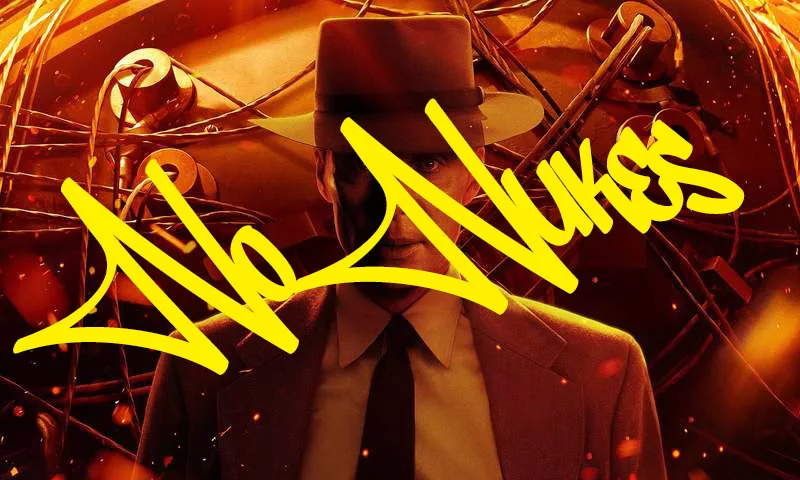
We watched this movie after arguing with social media pro-nuke apologists who accused us of being ill-informed as not having viewed Christopher Nolan’s biopic, so excuse the mess… (and if you haven’t already, read our initial post here for the context).
Oppenheimer is a glorification of the “complicated genius” and ambitions of white men making terrible decisions that imperil the world.
Many have remarked that the film is not a glorification, yet Christopher Nolan himself says, “Like it or not, J Robert Oppenheimer is the most important person who ever lived.”
Some of you may have even had a burst of laughter during the scene where Truman asked Oppenheimer what he thought the fate of Los Alamos should be and “Oppie” retorted, “Give the land back to the Indians.” But alas, the poisoned scarred landscape today is host to a 10-day “Oppenheimer Festival.” To underscore the disconnect of legacies, a small commemoration near the Churchrock spill site was also held on the anniversary of the Trinity detonation, a few hundred miles away. Yes, what glorification?
The movie is basically a Western à la John Wayne. It very well could have been called, “The Trial of the Sheriff of Los Alamos.”
Oppenheimer rides his horse with a black hat on and pulls a poster down from a fence post. He then strides into a debate on the “Impact of the gadget on civilization.” To respond to the question of how scientists can justify using the Atom Bomb on human beings, Oppenheimer speaks, “We’re theorists yes, we imagine a future and our imaginings horrify us. They won’t fear it until they understand it and they won’t understand it until they’ve used it. When the world learns the terrible secret of Los Alamos our work here will ensure a peace mankind has never seen. A peace based on international cooperation.”
Nolan establishes the only narrative that matters is his attempt at historical redemption, he paints Oppenheimer as a victim. While perhaps not as depoliticized as Nolan alluded to in interviews (as the politics of American loyalty and the Red Scare drive the drama), the consequences of nuclear weapons and energy is barely considered (arguably barely at all considering the issue). This is a political omission of the most insidious sort and the film is even worse for it.
The movie cares more about constructing and clearing Oppenheimer as a victim of McCarthyism than the impacts of the atomic bomb and its deadly legacy of nuclear colonialism. As it’s stated, there’s a “Price to be paid for genius.” Everything else is dramatic notation. Nolan gives Oppenheimer the public hearing he feels like he was denied to ultimately prove he was an American patriot. In the end, the question “Would the world forgive you if you let them crucify you?” matters above all other concerns. The movie poses the argument as “science versus militarism” while the world and Indigenous Peoples continue to suffer the permanent consequences of nuclear weapons and energy in silence. A deadly silence more deafening than Nolan’s cinematic portrayal of the Trinity test. But hey, there’s even a minute of cheering after the test.
Nolan has us listening to the radio while two cities are destroyed and hundreds of thousands of lives are taken. Nolan keeps the camera on his lead actor’s face while the horrors of his bomb are shown on slides. Oppenheimer simply looks away. What more about this film do we need to know?
15,000 abandoned uranium mines poisoning our bodies, lands, and water. 1,000 bombs detonated on Western Shoshone lands… the list goes on (we only stop here because we’ve stated much more in our original post). All omitted and sentenced to suffer in catastrophic silence. Films like Oppenheimer are only possible because people keep looking away from the deadly reality of nuclear weapons and energy.
#nonukes
Architect of Annihilation: Oppenheimer’s Deadly Legacy of Nuclear Terror
Published
2 years agoon
July 20, 2023By
Rudy
Read our quick and dirty review of the movie here.
Klee Benally, Indigenous Action/Haul No!
Contributions by Leona Morgan, Diné No Nukes/Haul No!
Printable posters (PDFs): 11″x17″ color, 11″x17″ black & white
The genocidal colonial terror of nuclear energy and weapons is not entertainment.
To glorify such deadly science and technology as a dramatic character study, is to spit in the face of hundreds of thousands of corpses and survivors scattered throughout the history of the so-called Atomic age.
Think of it this way, for every minute that passes during the film’s 3-hour run time, more than 1,100 citizens in the cities of Hiroshima and Nagasaki died due to Oppenheimer’s weapon of mass destruction. This doesn’t account for those downwind of nuclear tests who were exposed to radioactive fallout (some are protesting screenings), it doesn’t account for those poisoned by uranium mines, it doesn’t account for those killed during nuclear power plant melt-downs, it doesn’t account for those in the Marshall Islands who are forever poisoned.
For every second you sit in the air conditioned theater with a warm buttery popcorn bucket in your lap, 18 people dead in the blink of an eye. Thanks to Oppenheimer.
Though you’ll certainly learn enough about J. Robert Oppenheimer, the “father of the atomic bomb,” thanks to director Christopher Nolan’s 70mm IMAX odyssey, let’s be clear about his deadly legacy and the overall military and scientific industrial complex behind it.
After the successful detonation of the very first atomic bomb, Oppenheimer infamously quoted the Hindu scripture Bhagavad-Gita, “Now I am become death, the destroyer of worlds.” Barely a month later, the “U.S” dropped two atomic bombs devastating the cities of Hiroshima and Nagasaki and more than 200,000 people were killed. Some of the shadows of those perished were burned into the streets. One survivor, Sachiko Matsuo, relayed their thoughts as they tried to make sense of what was happening when Nagasaki was struck, “I could see nothing below. My grandmother started to cry, ‘Everybody is dead. This is the end of the world.” A devastation that Nolan intentionally leaves out because, according to the director, the film is not told from the perspectives of those who were bombed, but by those who were responsible for it. Nolan casually explains, “[Oppenheimer] learned about the bombings of Hiroshima and Nagasaki on the radio, the same as the rest of the world.”
Months after the atomic detonation at the “Trinity” site in occupied Tewa lands of New Mexico, Oppenheimer resigned. He walked away expressing the conflict of having, “blood on his hands,” (though reportedly he later said the bombings were not “on his conscience”) while leaving a legacy of nuclear devastation and radioactive pollution permanently poisoning lands, waters, and bodies to this day.
U.S. military and political machinery cannibalized the scientist and turned him into a villain of their imperialist cold-war anxiety. They reminded him and the other scientists behind the Manhattan Project, that they and their interests were always in control.
Oppenheimer never was a hero, he was an architect of annihilation.
The race to develop the first atomic bomb (after Nazis had split the atom) never could be a strategy of peaceful deterrence, it was a strategy of domination and annihilation.
Nazi Germany was committing genocide against Jewish people while the U.S. sat on the political sidelines. It wasn’t until they were directly threatened that the U.S. intervened. Though Nazi Germany was defeated on May 8th, 1945, the U.S. dropped two separate atomic bombs on the non-military targets of the Japanese cities of Hiroshima and Nagasaki on August 6th and 9th, 1945.
To underscore Oppenheimer’s complicity, he suppressed a petition by 70 Manhattan Project scientists urging President Truman not to drop the bombs on moral grounds. The scientists also argued that since the war was nearing its end, Japan should be given the opportunity to surrender.
Today there are approximately 12,500 nuclear warheads in nine countries with almost 90 percent of them held by the U.S. and Russia. It is estimated that 100 nuclear weapons is an “adequate… deterrence” threshold for the “mutually assured destruction” of the world.
Oppenheimer built the gun that is still held to the head of everyone who lives on this Earth today. Throughout the decades after the development of “The Bomb,” millions throughout the world have rallied for nuclear disarmament, yet politicians have never taken their fingers off the trigger.
The Deadly Legacy of Nuclear Colonialism
Nuclear weapons production and energy would not be possible without uranium.
Global uranium mining boomed during and after World War II and continues to threaten communities throughout the world.
Today, more than 15,000 abandoned uranium mines are located within the so-called U.S., mostly in and around Indigenous communities, permanently poisoning sacred lands and waters with little to no political action being taken to clean up their deadly toxic legacy.
Indigenous communities have long been at the front lines of the struggle to stop the deadly legacy of the nuclear industry. Nuclear colonialism has resulted in radioactive pollution that has poisoned drinking water systems of entire communities like Red Shirt Village in South Dakota and Sanders in Arizona. The U.S. Environmental Protection Agency has closed more than 22 wells on the Navajo Nation where there are more than 523 abandoned uranium mines. In Ludlow, South Dakota an abandoned uranium mine sits within feet of an elementary school, poisoning the ground where children continue to play to this day.
Nuclear colonialism has ravaged our communities and left a deadly legacy of cancers, birth defects, and other serious health consequences, it is the slow genocide of Indigenous Peoples.
From 1944 to 1986 some 30 million tons of uranium ore were extracted from mines on Diné lands. Diné workers were told little of the potential health risks with many not given any protective gear. As demand for uranium decreased the mines closed, leaving over a thousand contaminated sites. To this day none have been completely cleaned up.
On July 16, 1979, just 34 years after Oppenheimer oversaw the July 16, 1945 Trinity test, the single largest accidental release of radioactivity occurred on Diné Bikéyah (The Navajo Nation) at the Church Rock uranium mill. More than 1,100 tons of solid radioactive mill waste and 94 million gallons of radioactive tailings poured into the Puerco River when an earthen dam broke. Today, water in the downstream community of Sanders, Arizona is poisoned with radioactive contamination from the spill.
Although uranium mining is now banned on the reservation due to advocacy from Diné anti-nuclear organizers, Navajo politicians have sought to allow new mining in areas already contaminated by the industry’s toxic legacy. It is estimated that 25% of all the recoverable uranium remaining in the country is located on Diné Bikéyah.
Though there has never been a comprehensive human health study on the impacts of uranium mining in the area, a focused study has detected uranium in the urine of babies born to Diné women exposed to uranium.
Western Shoshone lands in so-called Nevada, which have never been ceded to the “U.S.” government, have long been under attack by the military and nuclear industries.
Between 1951 and 1992 more than 1,000 nuclear bombs have been detonated above and below the surface at an area called the Nevada Test Site on Western Shoshone lands which make it one of the most bombed nations on earth. Communities in areas around the test site faced severe exposure to radioactive fallout, which caused cancers, leukemia & other illnesses. Those who have suffered this radioactive pollution are collectively known as “Downwinders.”
Western Shoshone spiritual practitioner Corbin Harney, who passed on in 2007, helped initiate a grassroots effort to shutdown the test site and abolish nuclear weapons. He once said, “We’re not helping Mother Earth at all. The roots, the berries, the animals, are not here anymore, nothing’s here. It’s sad. We’re selling the air, the water, we’re already selling each other. Somewhere it’s going to come to an end.”
Between 1945 and 1958, sixty-seven atomic bombs were detonated in tests conducted in Ṃajeḷ (the Marshall Islands). Some Indigenous people of the islands have all together stopped reproducing due to the severity of cancer and birth defects they have faced due to radioactive pollution.
In 1987 the “U.S.” congress initiated a controversial project to transport and store almost all of the U.S.’s toxic waste at Yucca Mountain located about 100 miles northwest of so-called Las Vegas, Nevada. Yucca Mountain has been held holy to the Paiute and Western Shoshone Nations since time immemorial. In January 2010 the Obama administration approved a $54 billion dollar taxpayer loan in a guarantee program for new nuclear reactor construction, three times what Bush previously promised in 2005.
There are currently 93 operating nuclear reactors in the so-called U.S. that supply 20% of the country’s electricity. There are nearly 90,000 tons of highly radioactive spent nuclear waste stored in concrete dams at nuclear power plants throughout the country with the waste increasing at a rate of 2,000 tons per year.
From the 1979 disasters of Three Mile Island and Churchrock to the 1986 Chernobyl Nuclear Power Plant melted down, the nuclear industry has been wrought with mass catastrophes with permanent global consequences.
In 2011 Fukushima Daiichi Nuclear Power Plant catastrophically failed and began melting down after it was hit by an earthquake and tsunami. It’s been reported that the Fukushima plant has been leaking approximately 300 tons of radioactive water into the ocean every day. Today, the Japanese government is open about its plans to release remaining radioactive waters into the Pacific.
“Depleted Uranium” weapons deployed by the U.S. in imperialist wars (particularly Iraq and Afghanistan) have also poisoned eco-systems, including at proving grounds and firing ranges in Arizona, Maryland, Indiana and Vieques, Puerto Rico. Depleted uranium is a by-product of uranium enrichment process when it’s used for nuclear reactor fuel and in the making of nuclear weapons.
Nuclear energy production is now claimed as a “green solution” to the climate crisis, but nothing could be further from the truth of this deadly lie.
In April 2022, the Biden administration announced a $6 billion government bailout to “rescue” nuclear power plants at risk of closing. A colonial government representative stated, “U.S. nuclear power plants contribute more than half of our carbon-free electricity, and President Biden is committed to keeping these plants active to reach our clean energy goals.” They, along with Climate Justice activists cite nuclear energy as necessary to combat global warming, all while ignoring the devastating permanent impacts Indigenous Peoples have faced.
Due to this “greenwashing” of nuclear energy, we face a push for nuclear hydrogen, small modular nuclear reactors, and High-Assay Low-Enriched Uranium (HALEU) driving a renewed threat of new uranium mining, transportation, & processing.
Though the Obama administration placed a moratorium on thousands of uranium mine leases around the Grand Canyon in 2012, pre-existing uranium claims were allowed. Environmental groups and Indigenous Nations are currently attempting to make the moratorium permanent and push for a new national monument, yet these will do little to nothing for the handful of pre-existing uranium mines that have been allowed to move forward.
Despite these actions, underground blasting & above ground work has begun at Pinyon Plain/Canyon Mine, just miles from the Grand Canyon. Once Energy Fuels, the company operating the mine, starts hauling out radioactive ore, they plan to transport 30 tons per day through Northern Arizona to the company’s processing mill in White Mesa, 300 miles away.
The White Mesa Mill is the only conventional uranium mill licensed to operate in the U.S. The mill was built on sacred ancestral lands of the Ute Mountain Ute Tribe near Blanding, Utah. Energy Fuels disposes radioactive and toxic waste tailings in “impoundments” that take up about 275 acres next to the mill. Since there are limited radioactive waste facilities, White Mesa Mill has become an ad hoc dump for the world’s nuclear wastes that have no final repository.
In so-called New Mexico, a state addicted to nuclear monies for both nuclear weapons and energy facilities, there are two national nuclear labs and two national waste facilities. Along with legacy uranium mines and mills, there was Project Gasbuggy (an underground detonation), a “Broken Arrow” accident near Albuquerque, and countless tons of radioactive waste buried in unlined pits, Pueblo kivas, and watersheds. Currently, there are planned expansions and modifications at Los Alamos National Labs, the Waste Isolation Pilot Plant, and Urenco uranium enrichment facility. Most recently, the state has been threatened by two newly licensed consolidated interim storage facilities for “spent fuel” from nuclear power plants in New Mexico and Texas. The federal government continues to push nuclear projects with financial incentives.
Nuclear proliferation continues as the U.S. allows uranium miners and others who are eligible for the Radiation Exposure Compensation Act to die. Many continue to suffer and wait for compensation funds to be allocated or are not eligible due to the limitations of the act.
The devastation of nuclear colonialism, which permanently destroys Indigenous communities throughout the world, is not entertainment. This is the terrifying legacy of nuclear energy and weapons that movies like Oppenheimer and duplicitous climate justice activists advocate.
Indigenous Peoples live, suffer, and continue to resist its consequences every day.
END NUCLEAR COLONIALISM!
###
Recommended links:
https://haulno.com
http://www.dinenonukes.org
https://tewawomenunited.org/programs/environmental-health-and-justice-program
https://stopforeverwipp.org/home
https://www.trinitydownwinders.com/
http://www.cleanupthemines.org
https://www.nirs.org/
https://www.radioactivewastecoalition.org
https://www.dont-nuke-the-climate.org/
https://www.nuclear-heritage.net/index.php?title=Nuclear_Heritage_Network
https://yukiyokawano.com
https://www.youtube.com/watch?v=vBO_C6GkIpM&t=10s
https://apjjf.org/2022/1/Schattschneider-Auslander.html
Articles:
Red Water Pond Road
https://www.washingtonpost.com/national/a-radioactive-legacy-haunts-this-navajo-village-which-fears-a-fractured-future/2020/01/18/84c6066e-37e0-11ea-9541-9107303481a4_story.html
ABQ Museum
https://www.abqjournal.com/lifestyle/arts/albuquerque-museums-online-exhibit-trinity-takes-a-look-at-the-aftermath-of-the-atomic-bomb/article_33d17c15-61c8-5e1f-b32c-99f4ebee5db4.html
Get updates via email, sign up here:
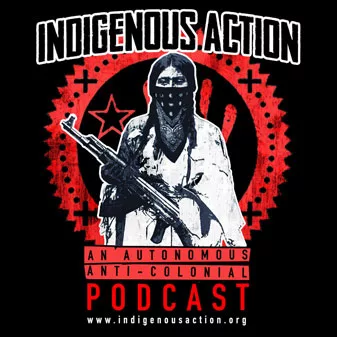
Indigenous Action Podcast
- Indigenous Action Podcast Ep. 18: No Settler Future An Anti-Year in Review (sorta)
- Indigenous Action Podcast Episode 17: Decolonization isn’t a Holiday
- Indigenous Action Podcast Episode 16: Fuck a Valentine, Indigenous Abolition Feminism
- Indigenous Action Podcast Episode 15: 15th Annual No Thanks, No Giving: Indigenous Anarchism
- Indigenous Action Podcast Episode 14: Queering #MMIWG2ST
Popular Posts
-

 anti-colonial5 years ago
anti-colonial5 years agoVoting is Not Harm Reduction – An Indigenous Perspective
-

 Feature Front1 year ago
Feature Front1 year agoThe family of Klee Benally thanks you for the donations!
-

 anti-colonial5 years ago
anti-colonial5 years agoRethinking the Apocalypse: An Indigenous Anti-Futurist Manifesto
-

 #nonukes12 years ago
#nonukes12 years agoIndigenous Elders and Medicine Peoples Council Statement on Fukushima
-

 anti-colonial3 years ago
anti-colonial3 years agoUnknowable: Against an Indigenous Anarchist Theory – Zine
-

 #nonukes15 years ago
#nonukes15 years agoUranium Mining Begins Near Grand Canyon
-

 #policestate5 years ago
#policestate5 years ago16 Things You Can Do To Be Ungovernable. P.S. Fuck Biden
-

 anti-colonial1 year ago
anti-colonial1 year agoNew Book: No Spiritual Surrender, Klee Benally



